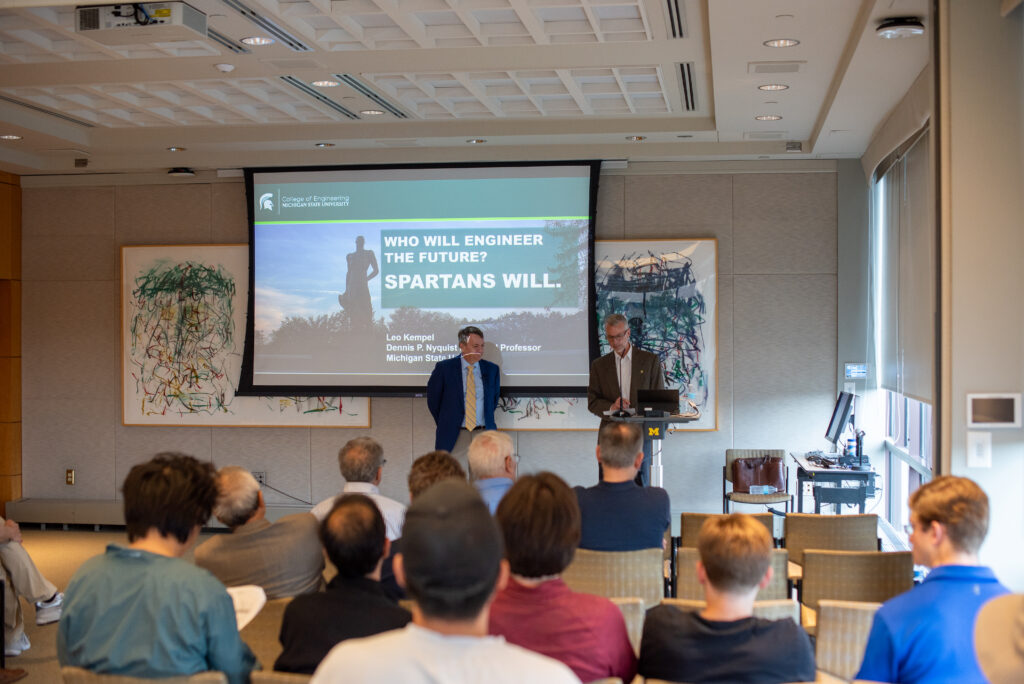Leo Kempel receives ECE Distinguished Alumni Educator Award
Leo Kempel (MSE PhD EE ‘90 ‘94), who served as the ninth dean of Michigan State University (MSU) College of Engineering, returned to U-M to receive the 2024 ECE Distinguished Alumni Educator Award, noting with fondness, “I left here 30 years ago, but Ann Arbor has always been home for me.”
Kempel presented his award lecture, “Engineering Education for the 2030s and Beyond,” with an overview of the state of engineering education in Michigan and his vision for its future. He began by outlining his professional journey, from first-generation college student at the University of Cincinnati (UC) in his home state of Ohio to Dennis P. Nyquist Endowed Professor of Electromagnetics at Michigan State University.
As an engineering undergraduate at UC, Kempel was part of a co-op program that paid him to spend some semesters working for industry. He realized that many of his industry colleagues and mentors had graduate degrees––and he resolved to get one himself. He moved to Ann Arbor to join the graduate program in electrical engineering.
“I had a fantastic time with the leaders and best,” Kempel said. “Grad school [is] the best time. It’s the last time in your life you get to just do one thing and really concentrate on it.”
From there, he took a job at Mission Research Corporation (now part of Northrop Grumman), where he learned the necessary skills to acquire research funding before being recruited to MSU as an assistant professor in 1998. He was named Dennis P. Nyquist Endowed Professor of Electromagnetics in 2020. He served as the ninth dean of the Michigan State University College of Engineering from 2014 through September 2024, acting dean and associate dean for research from 2008 to 2013, associate dean for special initiatives from 2006 to 2008, and the inaugural director of the MSU High Performance Computing Center from 2004 to 2006.
His 26-year career at MSU has given Kempel a unique bird’s-eye view of the engineering education system and its potential for improvement. As a lifelong Midwesterner, he is dedicated to helping the next generation of students––especially electrical and computer engineers––improve local communities and economies throughout Michigan and the Midwest.

“The need for electrical engineers is growing faster than the supply,” Kempel said, pointing to a chart of prospects for electrical engineers in the next 10 years.
Programs like the Michigander Scholars Program, which both MSU’s College of Engineering and U-M EECS participate in, provide financial incentive to electrical and computer engineering students who take internship and/or employment opportunities in the electric vehicle and semiconductor industries. Under Kempel, MSU also recruits and supports incoming students from historically marginalized backgrounds through a program called the Engineering and Science Success Academy (ESSA).
“[Our work] is not just attracting students, it’s helping them succeed,” Kempel said. “It’s very simple. The ESSA program works because it advances them by a math course.”
MSU’s data has shown that the first math class an incoming freshman is placed into is the biggest indicator of whether that student will graduate with an engineering degree. ESSA invites students who have lower math placement scores to spend part of the summer on campus learning from MSU instructors and peer mentors. The program is free to the students, and Kempel showed that two thirds of the students were able to advance by at least one math class after four weeks.
Our work is not just attracting students, it’s helping them succeed.
Leo Kempel
Kempel has also taken stock of the ways that education has changed over the years, especially with the shift to virtual learning over the COVID-19 pandemic and the integration of AI tools into everyday life. He noted that with the availability of AIs like ChatGPT, homework performance did not predict exam scores––and that exams are often an artificial way to evaluate learning. Rather, Kempel came to prefer open-ended assignments that mimic what students will be doing in their jobs after graduation, encouraging creativity and learning through failures.
“Gen AI is just a tool––students will be using it,” he said. “What we really need to teach the students is when to identify whether the answers make sense or not. That’s the biggest skill that we teach them.”
Kempel ended his lecture with a proposal to restructure education for two groups of students: 1) those who will continue on to graduate school and 2) those who will take full-time jobs in industry. The skills that these groups of students will need in their future careers will be different, Kempel suggested, so why not lay those paths out for them?
Students interested in grad school could focus on deeper subject knowledge, math skills, and research experience; meanwhile, students interested in full-time jobs could master the AI tools at their disposal, focus on design challenges, and gain experience in internships and co-ops.
Kempel left his audience with a question to consider: “Think about all the changes that happened in the last 20 years. Shouldn’t we rethink the way we teach students?”
 MENU
MENU 
